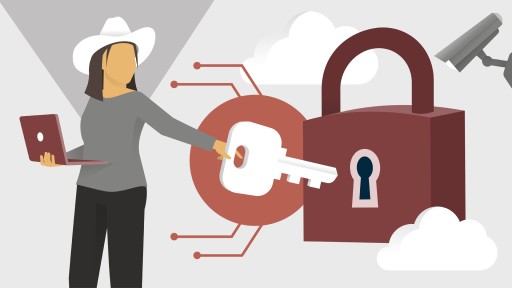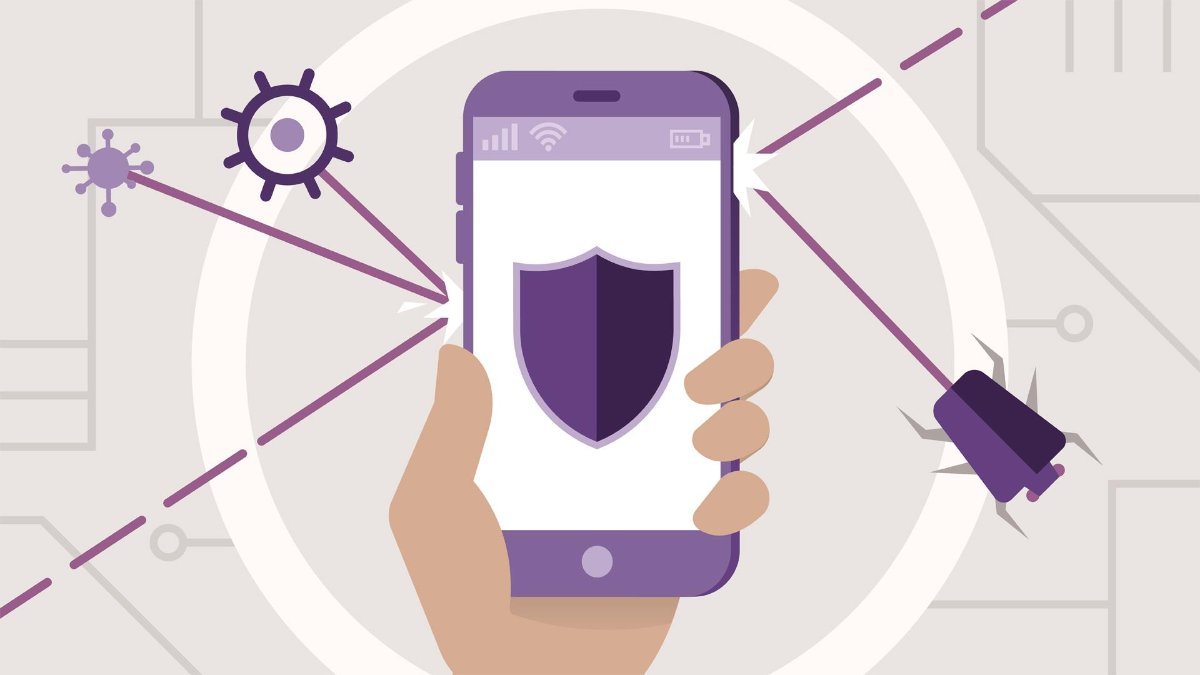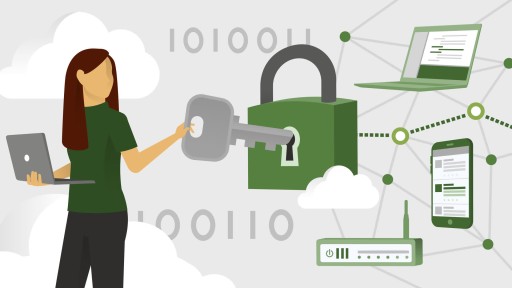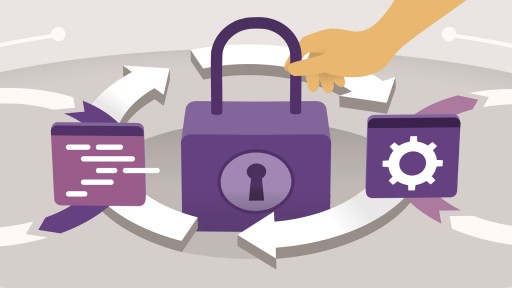
Ethical hacking tests the strength of an organization's defenses and is a desired skill for any IT professional. In this course, security expert Lisa Bock explains how to protect data in a digital world and covers the basics of Information security. She begins by discussing how to layer defenses and outlines the power of using adaptive security controls. Lisa describes how artificial intelligence can help early threat detection and explains the benefits of MITRE ATT&CK, which provides tools and techniques specific to the ethical hacking process. She then stresses the need to maintain a vigilant posture, by using threat modeling and cyber threat intelligence. Lisa also provides an overview of the various hacker frameworks and reviews the laws and standards that define best practice behavior. She concludes by covering why it’s essential to perform ethical hacking, examines attack types and motives, lists the main hacking phases, and outlines the desired skills of an ethical hacker.
Topics include:
Deze cursus is enkel beschikbaar in het Engels. Als dit voor u geen probleem vormt, dien dan gerust uw aanvraag in.
Deze cursus is enkel beschikbaar in het Frans. Als dit voor u geen probleem vormt, dien dan gerust uw aanvraag in.

Learn how to investigate, respond to, and hunt for threats using Microsoft Sentinel, Microsoft Defender XDR and Microsoft Defender for Cloud. In this course you will learn how to mitigate cyberthreats using these technologies. Specifically, you will configure and use Microsoft Sentinel as well as utilize Kusto Query Language (KQL) to perform detection, analysis, and reporting. The course was designed for people who work in a Security Operations job role and helps learners prepare for the exam SC-200: Microsoft Security Operations Analyst.
The Microsoft Security Operations Analyst collaborates with organizational stakeholders to secure information technology systems for the organization. Their goal is to reduce organizational risk by rapidly remediating active attacks in the environment, advising on improvements to threat protection practices, and referring violations of organizational policies to appropriate stakeholders. Responsibilities include threat management, monitoring, and response by using a variety of security solutions across their environment. The role primarily investigates, responds to, and hunts for threats using Microsoft Sentinel, Microsoft Defender XDR, Microsoft Defender for Cloud, and third-party security products. Since the Security Operations Analyst consumes the operational output of these tools, they are also a critical stakeholder in the configuration and deployment of these technologies.

En tant que responsable de la sécurité ou DSI, vous devez mettre en place une politique de cybersécurité pour répondre aux menaces qui pèsent sur votre informatique. Pour cela, Pierre Cabantous vous propose de faire un tour de la cybersécurité en entreprise. Dans ce cours, vous étudierez la démarche d'un pirate, avant et après l'intrusion dans un système, à la suite de l'exploitation d'une vulnérabilité. Vous verrez comment gérer ces vulnérabilités par rapport à un niveau de risque que vous apprendrez à calculer. Vous aborderez aussi une des principales menaces encourues aujourd'hui par tout service accessible en ligne : les attaques par déni de service. Puis vous découvrirez comment protéger votre organisation aux niveaux technique et organisationnel, en suivant des bonnes pratiques, des process ainsi que des normes européennes comme le RGPD.
Topics include:
Deze cursus is enkel beschikbaar in het Engels. Als dit voor u geen probleem vormt, dien dan gerust uw aanvraag in.
Deze cursus is enkel beschikbaar in het Frans. Als dit voor u geen probleem vormt, dien dan gerust uw aanvraag in.

Social engineering is a technique hackers use to manipulate end users and obtain information about an organization or computer systems. In order to protect their networks, IT security professionals need to understand social engineering, who is targeted, and how social engineering attacks are orchestrated. In this course, cybersecurity expert Lisa Bock discusses the methods a hacker might use, including embedding malicious links and attachments in emails and using mobile devices and social media to deploy an attack. She discusses the concept of "misuse of trust"—how hackers use charm, power, and influence to penetrate an organization—and why you need to be extra cautious with the disgruntled employee. Finally, Lisa discusses countermeasures security professionals can take to address these attacks. Note: This course maps to the Social Engineering competency of the Certified Ethical Hacker exam. You can review the exam objectives on the official EC-Council website.
Topics include:
- Visualizing the victim
- Recognizing an attack
- Using charm, power, and influence
- Manipulating with social media
- Preventing insider attacks
- Stealing identities
- Pen testing with social engineering
- Taking countermeasures
Deze cursus is enkel beschikbaar in het Engels. Als dit voor u geen probleem vormt, dien dan gerust uw aanvraag in.
Deze cursus is enkel beschikbaar in het Frans. Als dit voor u geen probleem vormt, dien dan gerust uw aanvraag in.

Mobile devices are used for our most sensitive transactions, including email, banking, and social media. But they have a unique set of vulnerabilities, which hackers are all too willing to exploit. Security professionals need to know how to close the gaps and protect devices, data, and users from attacks. Join cybersecurity expert Malcolm Shore as he explores the two dominant mobile operating systems, Android and iOS, and shows ways to protect devices through analysis and testing. Watch this course to review the basics of mobile OS models, the toolsets you need for testing, and the techniques for detecting and preventing the majority of security flaws. These methods are recognized by EC Council as integral part of those looking to earn their Certified Ethical Hacker certification. The complete CEH BOK can be found at https://www.eccouncil.org/Certification/certified-ethical-hacker/CEH-What-You-Will-Learn.
Topics include:
- Statistic and dynamic analysis of mobile applications
- Testing on Android
- Analyzing Android applications
- Securing iOS applications
- Jailbreaking iOS for command-line access
- Analyzing iOS apps
Deze cursus is enkel beschikbaar in het Engels. Als dit voor u geen probleem vormt, dien dan gerust uw aanvraag in.
Deze cursus is enkel beschikbaar in het Frans. Als dit voor u geen probleem vormt, dien dan gerust uw aanvraag in.

Wireless networks are convenient and popular, but poor configuration and encryption leave them open to attack. Hackers can use Wi-Fi vulnerabilities to infiltrate your entire network. Security professionals need to know how to detect, prevent, and counter these kinds of attacks using the latest tools and techniques—the subject of this course with cybersecurity expert Malcolm Shore. Malcolm covers everything from configuring basic security to understanding how hackers extract passwords, harvest connections at rogue access point, and attack networks via Bluetooth. He also explains how to select the right antennae for testing and introduces some sophisticated Windows and Linux tools to scan for vulnerabilities, including Acrylic, Ekahau, and Wireshark. By the end of the course, you should be able to shore up your wireless connections and gain confidence that your local network is safe to use. Note: This course is part of our test prep series for the Certified Ethical Hacker exam. Review the complete exam objectives at https://www.eccouncil.org/programs/certified-ethical-hacker-ceh/.
Topics include:
- Selecting an antenna
- Configuring security
- Extracting WEP and network passwords
- Testing passwords
- Harvesting connections from rogue access points
- Attacking networks via Bluetooth
- Capturing wireless packets with Acrylic Wi-Fi
- Heat mapping with Ekahau
- Wi-Fi sniffing with Wireshark
- Testing the Internet of Things
Deze cursus is enkel beschikbaar in het Engels. Als dit voor u geen probleem vormt, dien dan gerust uw aanvraag in.
Deze cursus is enkel beschikbaar in het Frans. Als dit voor u geen probleem vormt, dien dan gerust uw aanvraag in.

SMALS STANDARDS
IAM
Team, met name Identity & Access Management alsook Netwerk Security cel
worden je voorgesteld.
Beide
teams zijn bezig met toegepaste praktijk van Application Security @ Smals.
- Leraar: Katleen Rolies

The number of IoT (Internet of Things) devices deployed is increasing exponentially, which presents significant security challenges. In this course, Lisa Bock covers topics related to the IoT and OT hacking domain from the CEH body of knowledge. Lisa dives into the myriad of security challenges that the IoT faces, highlighting the importance of conducting ethical hacking to unearth vulnerabilities within IoT and operational technology (OT) devices. The course covers strategies for managing OT and industrial control systems (ICS). Furthermore, Lisa outlines methods for executing attacks on IoT/OT systems along with ways to safeguard systems against potential attacks, to ensure participants are well-equipped to protect these technologies. To help apply these concepts, Lisa provides a list of resources for best practice frameworks and guidance on securing IoT/OT systems. At the end of the course, you will have a robust arsenal to navigate the complex landscape of IoT security.
Topics include:
Deze cursus is enkel beschikbaar in het Engels. Als dit voor u geen probleem vormt, dien dan gerust uw aanvraag in.
Deze cursus is enkel beschikbaar in het Frans. Als dit voor u geen probleem vormt, dien dan gerust uw aanvraag in.

● Secure your computer, your network, and your data from 99% of all attacks on the Internet
● Find and fix weaknesses and harden your computer's security
● Keep yourself safe online, at home, at school, or at work
● Test for security vulnerabilities using the tricks the bad guys use
● Avoid phishing, viruses, ransomware, and online scams
Aanvraag indienen

Security is a major concern in the DevOps world. There is a constant push for companies to move more quickly, and security teams struggle to keep up with testing. This has led to the rise of a new field: DevSecOps. This course introduces the concept of DevSecOps and explains how an organization can build out a DevSecOps program that helps teams integrate security into the application development pipeline. Learn about the role of APIs, containers, security as code, and automation, and how a continuous integration and delivery framework can help your organization run security tests as often as developers want. Instructor Tim Chase also introduces some free tools and resources for starting your DevSecOps journey.
Topics include:
- Recognize which groups make up DevOps.
- Identify what should be included in the DevSecOps process.
- Explain how API and security testing function.
- Indicate the challenges and benefits of CI/CD.
- Recognize the central repository for containers.
- Describe how to secure IaC.
- Identify where DevSecOps test results are placed.
Deze cursus is enkel beschikbaar in het Engels. Als dit voor u geen probleem vormt, dien dan gerust uw aanvraag in.
Deze cursus is enkel beschikbaar in het Frans. Als dit voor u geen probleem vormt, dien dan gerust uw aanvraag in.

Duurtijd van de opleiding: 2,22u.
Ethical hacking involves testing to see if an organization's network is vulnerable to outside attacks. It's one of the most desired skills in an IT security professional. In this course, security ambassador Lisa Bock guides you through the System Hacking competency from the CEH Body of Knowledge. Find out how hackers are able to hack into a system and gain access. Learn about privilege escalation, keyloggers, and spyware. Plus, explore countermeasures that IT security professionals can take to prevent these attacks.
Topics include:
Deze cursus is enkel beschikbaar in het Engels. Als dit voor u geen probleem vormt, dien dan gerust uw aanvraag in.
Deze cursus is enkel beschikbaar in het Frans. Als dit voor u geen probleem vormt, dien dan gerust uw aanvraag in.
